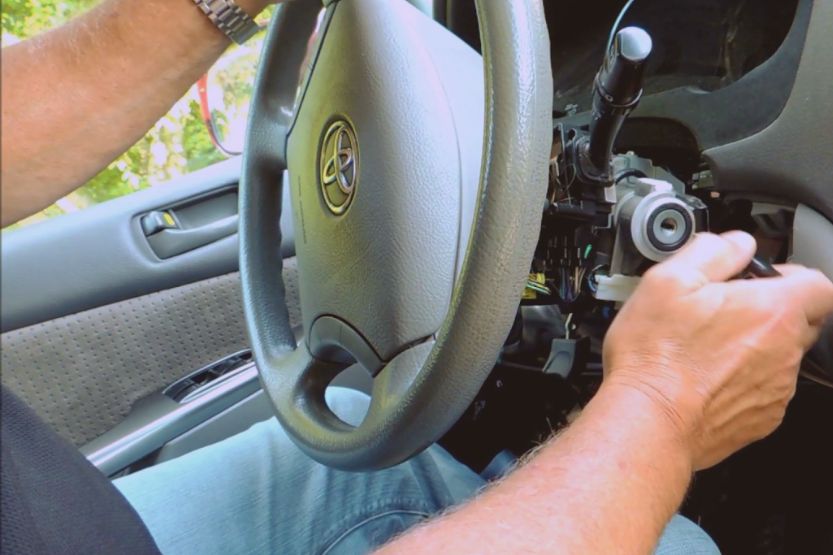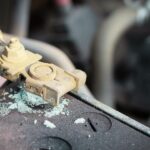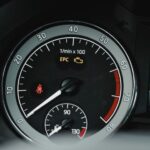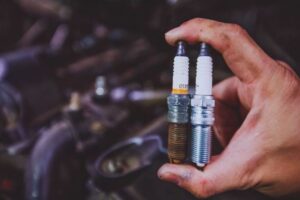When a car’s engine revs up while it is in park, it can be concerning for the driver. There are a variety of reasons why a car may rev in park, and understanding these reasons can help drivers diagnose and fix the issue. In this article, we will explore the common causes of a car revving in park and provide solutions to help drivers get their car back to operating normally.
Some of the most common reasons why a car may rev in park include a dirty air flow sensor, a faulty throttle sensor, a damaged O2 sensor, vacuum leak, a plugged EGR valve, brittle wiring, and defective computer. Additionally, older cars may experience a stuck throttle cable. While these issues may seem daunting, many of them can be fixed with simple solutions such as cleaning or replacing sensors, replacing wiring, or tightening connections.
It is important for drivers to take care of any issues with their car as soon as possible to prevent further damage and ensure the safety of themselves and others on the road. By understanding the common causes of a car revving in park and taking steps to fix the issue, drivers can keep their car running smoothly and avoid potentially costly repairs down the line.
Why Does a Car Rev in Park?

When a car revs in park, it means that the engine is running at a higher RPM than it should be. This can be caused by a variety of factors, including mechanical issues, electrical problems, and even user error.
One common cause of a car revving in park is a problem with the throttle body. The throttle body controls the amount of air that enters the engine, and if it is not functioning properly, the engine may rev even when the car is not in gear. Another possible cause is a vacuum leak, which can cause the engine to run lean and rev excessively. Additionally, a malfunctioning oxygen sensor or EGR valve can also cause the engine to rev in park.
It’s important to note that sometimes a car may rev in park simply because the user is pressing the gas pedal too hard. This is especially common with newer cars that have sensitive throttle systems. In this case, there is no mechanical or electrical issue causing the revving, and the problem can be easily solved by adjusting the driver’s behavior.
Overall, there are many possible reasons why a car may rev in park. By understanding the most common causes, drivers can better diagnose and address the issue, whether it requires a simple adjustment or a more complex repair.
Potential Causes of Car Revving in Park
When a car’s engine revs up on its own while in park, it can be a sign of a problem. Some of the potential causes of car revving in park are:
Faulty Idle Control Valve
The idle control valve, also known as the idle air control valve, regulates the amount of air that flows into the engine when the car is idling. If this valve is faulty, it can cause the engine to rev up on its own. The valve may need to be cleaned or replaced.
Vacuum Leak
A vacuum leak is when there is a leak in the vacuum system that controls various components of the engine. This can cause the engine to rev up on its own. A vacuum leak can be caused by a cracked or damaged vacuum hose, a faulty intake manifold gasket, or a faulty brake booster.
Throttle Body Malfunction
The throttle body controls the amount of air that flows into the engine. If the throttle body is dirty or malfunctioning, it can cause the engine to rev up on its own. The throttle body may need to be cleaned or replaced.
Other potential causes of car revving in park include a dirty or malfunctioning mass airflow sensor, a malfunctioning EGR valve, or a faulty computer.
If a car is revving up on its own while in park, it is important to have it inspected by a qualified mechanic to determine the cause of the problem and to prevent any further damage to the engine.
How to Stop a Car from Revving in Park

If your car is revving in park, it could be due to several reasons, including a faulty idle control valve, vacuum leak, or dirty throttle body. Here are some steps to take to stop a car from revving in park:
Check for Faulty Idle Control Valve
The idle control valve is responsible for regulating the idle speed of your car’s engine. If it’s faulty, it can cause your car to rev in park. You can check for a faulty idle control valve by following these steps:
- Start your car and let it idle for a few minutes.
- Open the hood and locate the idle control valve.
- Disconnect the electrical connector from the valve.
- If the idle speed drops, the valve is faulty and needs to be replaced.
Inspect for Vacuum Leak
A vacuum leak occurs when there’s a hole or crack in the vacuum system, causing air to enter the engine when it’s not supposed to. This can cause your car to rev in park. Here’s how to inspect for a vacuum leak:
- Start your car and let it idle.
- Listen for any hissing noises coming from under the hood.
- Inspect the vacuum hoses for cracks or holes.
- If you find any issues, replace the affected hoses.
Clean or Replace Throttle Body
The throttle body controls the amount of air that enters the engine. If it’s dirty or faulty, it can cause your car to rev in park. Here’s how to clean or replace the throttle body:
- Remove the air intake hose from the throttle body.
- Clean the throttle body with a throttle body cleaner and a rag.
- If the throttle body is faulty, replace it with a new one.
By following these steps, you can stop your car from revving in park and ensure that it’s running smoothly.
Conclusion
When a car revs in park, it can be a sign of a few different things. It could be something as simple as the idle being set too high, or it could be a more serious issue like a failing throttle body or a vacuum leak. If left unchecked, these problems can lead to more significant issues down the line.
It’s important to take any unusual engine behavior seriously and have it checked out by a qualified mechanic. This can help prevent more significant issues from developing and keep your car running smoothly.
Additionally, it’s important to remember that revving an engine in park can have negative consequences. While it may warm up the engine faster, it can also increase fuel consumption and wear and tear on the engine. It’s best to let the engine run for at least two minutes at its normal idle speed before revving it higher, if necessary.
Overall, understanding the common causes of a car revving in park and taking preventative measures can help keep your car in good condition and prevent more significant issues from developing.







![Read more about the article How Much Do Hydraulics Cost? [Car Hydraulics Price Estimates]](https://roadsumo.com/wp-content/uploads/2021/07/how-much-do-hydraulics-cost-300x200.jpg)

![Read more about the article License Plate Screw Size [Standard Sizes for Popular Car Models]](https://roadsumo.com/wp-content/uploads/2020/10/license-plate-screw-size-300x200.jpg)